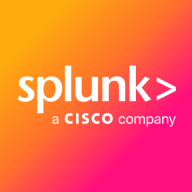

Splunk Enterprise Security and Fortra Event Manager are key players in the cybersecurity solutions market, with a focus on threat detection and response. Customers often perceive Splunk Enterprise Security as superior due to its advanced analytics and customization capabilities, although Fortra Event Manager is valued for its practical out-of-the-box features.
Features: Splunk Enterprise Security offers robust threat intelligence and advanced analytics, along with strong search capabilities. It is particularly effective for large-scale data analysis. Fortra Event Manager stands out with its straightforward integration and automated response features, enhancing threat management. Key differences include Splunk's efficiency in handling large data volumes, while Fortra prioritizes ease of integration and automation.
Ease of Deployment and Customer Service: Splunk Enterprise Security can be complex to deploy, with substantial initial configuration and training needs, but benefits from detailed documentation and extensive community support. Fortra Event Manager offers a simpler deployment process with its easy setup and intuitive management, appealing to customers. Fortra is known for its responsive support team, contrasting with Splunk's dependence on self-service resources.
Pricing and ROI: Splunk Enterprise Security is linked with higher setup costs, reflecting its comprehensive capabilities. Organizations that maximize its features report significant ROI. Fortra Event Manager is a more cost-effective option, providing a faster return on investment through its simpler pricing structure and effective deployment, particularly beneficial for smaller to mid-sized organizations.
| Product | Market Share (%) |
|---|---|
| Splunk Enterprise Security | 7.1% |
| Fortra's Event Manager | 0.5% |
| Other | 92.4% |
| Company Size | Count |
|---|---|
| Small Business | 112 |
| Midsize Enterprise | 50 |
| Large Enterprise | 266 |
Organizations have different requirements and varying degrees of resources. Event Manager is easy-to-use, yet sophisticated. As a result, organizations of all sizes and industries rely on our security information and event management platform to take their threat detection and response to the next level.
Midsized organizations, and those with limited resources, rely on Event Manager to help them proactively manage risk with their existing staff. Out-of-the-box security with Event Manager makes it easy to manage the entire threat lifecycle. You don’t have to be a security expert and you don’t need to be fluent across the multiple technologies that support your business.
Large enterprises typically deal with an unmanageable number of security events and rely on Event Manager to detect and escalate critical events in real-time. Our SIEM platform also provides normalization and data enrichment, making it easy for security analysts to interpret security event data and respond quickly. Event Manager makes rapid threat detection and response attainable for organizations with large, complex networks and a high volumes of security events to manage.
Splunk Enterprise Security delivers powerful log management, rapid searches, and intuitive dashboards, enhancing real-time analytics and security measures. Its advanced machine learning and wide system compatibility streamline threat detection and incident response across diverse IT environments.
Splunk Enterprise Security stands out in security operations with robust features like comprehensive threat intelligence and seamless data integration. Its real-time analytics and customizable queries enable proactive threat analysis and efficient incident response. Integration with multiple third-party feeds allows detailed threat correlation and streamlined data visualization. Users find the intuitive UI and broad compatibility support efficient threat detection while reducing false positives. Despite its strengths, areas such as visualization capabilities and integration processes with cloud environments need enhancement. Users face a high learning curve, and improvements in automation, AI, documentation, and training are desired to maximize its potential.
What Are the Key Features of Splunk Enterprise Security?In specific industries like finance and healthcare, Splunk Enterprise Security is instrumental for log aggregation, SIEM functionalities, and compliance monitoring. Companies leverage its capabilities for proactive threat analysis and response, ensuring comprehensive security monitoring and integration with various tools for heightened operational intelligence.
We monitor all Security Information and Event Management (SIEM) reviews to prevent fraudulent reviews and keep review quality high. We do not post reviews by company employees or direct competitors. We validate each review for authenticity via cross-reference with LinkedIn, and personal follow-up with the reviewer when necessary.